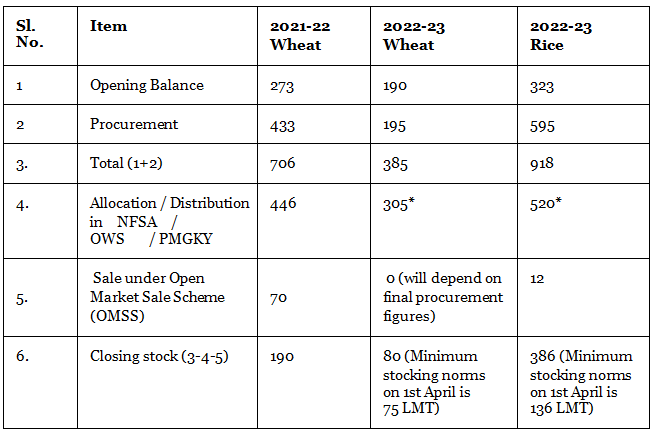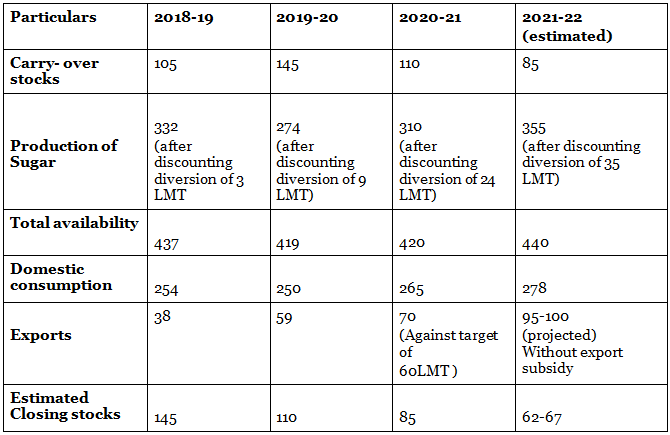Surplus Overall Grain Availability in the Country | Agriculture Optional for UPSC PDF Download
India's Comfortable Food Situation and Surplus Grain Stocks
India currently enjoys a favorable food situation, marked by an overall surplus of grain availability, as revealed by Shri Sudhanshu Pandey, the Secretary of the Department of Food and Public Distribution (DFPD). According to him, stock levels are expected to exceed the minimum requirements for the coming year.
During a press conference held in New Delhi, Shri Sudhanshu Pandey disclosed that as of April 1, 2023, India is projected to possess a substantial wheat stock of 80 LMT (Lakh Metric Tons), surpassing the minimum requirement of 75 LMT. This surplus is achieved despite wheat production estimates being slightly lower at 1050 LMT compared to the initial projection of 1110 LMT for the fiscal year 2023.
When asked about the reduced wheat procurement, Shri Pandey attributed it to higher market prices. He mentioned that traders are buying substantial quantities of wheat at rates higher than the Minimum Support Price (MSP), which is advantageous for farmers. He noted, "This year due to an increase in market prices and higher demand by private players for both domestic and export purposes, the government agency's purchases have decreased. However, this benefits the farmers as they are receiving a good price for their wheat."
Shri Pandey explained the changing scenario for farmers, stating that they no longer have to sell their entire wheat produce to the government. Instead, they choose to sell only the surplus quantity to the government, retaining the ability to sell in the private market. This has led to a reduction in government procurement.
The Secretary highlighted the surplus availability of rice, with procurement of approximately 600 LMT in the previous year and a similar figure expected for the current year. He pointed out that the annual requirement for the National Food Security Act (NFSA) is approximately 350 LMT, resulting in a surplus situation. Shri Pandey added that starting from the next year, fortified rice will be distributed through the entire Public Distribution System (PDS), given the surplus rice stocks.
Shri Pandey emphasized the decentralized procurement of rice, wherein states procure and distribute rice locally. This reduces logistical costs and streamlines distribution. He mentioned that this approach avoids the need for double movement of stocks from centralized locations, benefiting exports and the overall efficiency of the supply chain.
The Secretary also discussed the reallocation of rice instead of wheat in the Pradhan Mantri Garib Kalyan Yojana (PMGKY). This allocation was made in consultation with all states and union territories after considering their preferences. Shri Pandey explained that the reallocation simplifies the reimbursement process for food subsidy claims and benefits states that are predominantly consumers of rice.
Regarding wheat exports, Shri Sudhanshu Pandey shared that 40 LMT of wheat had been contracted for export, with 11 LMT already exported in April 2022. He mentioned that Turkey had approved Indian wheat imports, and from June, wheat from Argentina and Australia would enter international markets, providing export opportunities.
Shri Pandey also assured that India's edible oil stocks are sufficient, and palm oil imports are expected to resume soon, potentially easing edible oil prices after a temporary ban by Indonesia.

Wheat - 2022-23
The estimated wheat production for the year 2022-23 stands at 1050 LMT, which is slightly lower than the initial estimate of 1113 LMT. The central pool's opening stock is 190 LMT. The expected wheat procurement for this year is projected to be 195 LMT, a decrease from the previous year. Several factors contribute to this reduction:
In states like Madhya Pradesh (MP), Uttar Pradesh (UP), Rajasthan, and Gujarat, farmers are selling their wheat to traders and exporters at prices ranging from 21 to 24 Rs/kg, which are better than the Minimum Support Price (MSP) of 20.15 Rs/kg.
Punjab, Haryana, and UP have experienced lower wheat production due to early summer conditions, resulting in shriveled grains.
Farmers and traders are also holding onto some quantities in anticipation of higher wheat prices in the coming months.
The total wheat required for various programs, including the National Food Security Act (NFSA), Other Welfare Schemes (OWS), and 6 months of Pradhan Mantri Garib Kalyan Yojana (PMGKY), amounts to 305 LMT. Additionally, a reserve stock of 75 LMT is mandated to be maintained by the Food Corporation of India (FCI) on April 1, and the stocks are expected to be approximately 80 LMT.
Exports
Wheat:
Wheat exports have seen fluctuations in recent years, with 2019-20 at 2.17 LMT, 2020-21 at 21.55 LMT, and 2021-22 at 72.15 LMT.
Government efforts have led to India gaining market access in several countries, including Egypt.
As of April 2022, about 40 LMT of wheat has been contracted for export, and approximately 11 LMT have already been exported.
Rice:
- Rice exports have also shown variations, with 2019-20 at 94.90 LMT, 2020-21 at 177.79 LMT, and 2021-22 at 211.87 LMT.

|
52 videos|224 docs
|
FAQs on Surplus Overall Grain Availability in the Country - Agriculture Optional for UPSC
| 1. What is the current food situation in India? |  |
| 2. How does surplus grain availability benefit India? |  |
| 3. What is the significance of surplus grain stocks in India? |  |
| 4. How does surplus grain availability impact the economy of India? |  |
| 5. What measures are taken to maintain surplus grain stocks in India? |  |





















